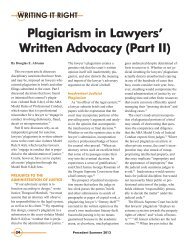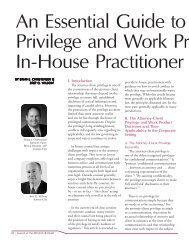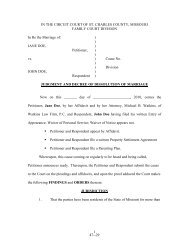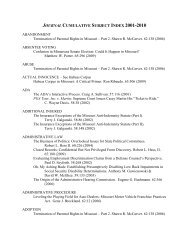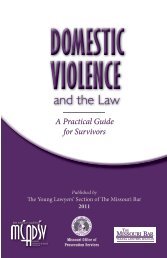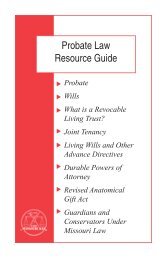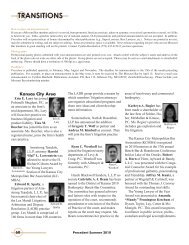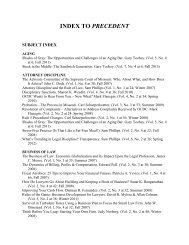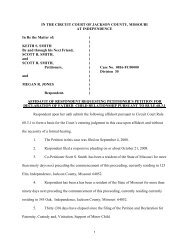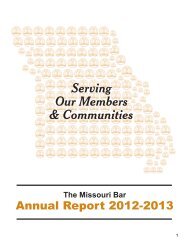Victim Confidentiality Laws Promote Safety and ... - the Missouri Bar
Victim Confidentiality Laws Promote Safety and ... - the Missouri Bar
Victim Confidentiality Laws Promote Safety and ... - the Missouri Bar
Create successful ePaper yourself
Turn your PDF publications into a flip-book with our unique Google optimized e-Paper software.
In o<strong>the</strong>r words, it is not <strong>the</strong> role of<br />
a counselor to record conversations<br />
in <strong>the</strong> same manner that a law<br />
enforcement investigator is trained<br />
to record a victim’s statement. With<br />
this in mind, rape counselor-victim<br />
confidentiality statutes such as<br />
§ 455.003 make sense at many levels.<br />
Even so, § 455.003 remains<br />
relatively untested. For example, it<br />
is too early to tell whe<strong>the</strong>r <strong>the</strong> broad<br />
definition of “rape crisis center” will<br />
withst<strong>and</strong> appellate scrutiny. Many<br />
counseling centers not only offer<br />
assistance for sexual assault recovery<br />
but also for drug addiction, suicidal<br />
threats, mental health issues <strong>and</strong> o<strong>the</strong>r<br />
crises. Most of <strong>the</strong>se agencies do not<br />
call <strong>the</strong>mselves rape crisis centers for<br />
this reason but may still fall within<br />
<strong>the</strong> statute’s definition of “rape crisis<br />
center.” In recent proceedings in a<br />
civil suit brought by an alleged victim<br />
against a priest <strong>and</strong> his diocese, <strong>the</strong><br />
trial court allowed <strong>the</strong> defense to<br />
depose <strong>the</strong> executive director of a<br />
support group, Survivors Network of<br />
Those Abused by Priests (SNAP), after<br />
SNAP argued, among o<strong>the</strong>r <strong>the</strong>ories,<br />
that <strong>the</strong> deposition should be quashed<br />
on <strong>the</strong> basis that SNAP is a rape crisis<br />
center as defined by § 455.003. 33<br />
Safe at Home: § 589.663<br />
In ano<strong>the</strong>r statute, § 589.663,<br />
<strong>Missouri</strong> joins a majority of states<br />
throughout <strong>the</strong> country that have<br />
enacted address confidentiality<br />
programs. 34 Identified statutorily as<br />
<strong>the</strong> “Address <strong>Confidentiality</strong> Program”<br />
<strong>and</strong> referred to by <strong>the</strong> Secretary of<br />
State’s Office as <strong>the</strong> “Safe at Home”<br />
program, this statute outlines a<br />
method for victims of limited crimes<br />
to obtain a post office box through<br />
<strong>the</strong> Secretary of State’s Office to be<br />
used in court proceedings in lieu of a<br />
physical street address. The program<br />
does not apply to all victims who<br />
seek protection from disclosure of<br />
<strong>the</strong>ir address or o<strong>the</strong>r information; it<br />
applies only to “victims of domestic<br />
violence, rape, sexual assault, or<br />
stalking.” 35 Each application for<br />
acceptance into <strong>the</strong> program must<br />
be jointly completed with a trained<br />
application assistant <strong>and</strong> <strong>the</strong>n<br />
reviewed by <strong>the</strong> Secretary of State,<br />
who may <strong>the</strong>n “certify <strong>the</strong> applicant as<br />
a program participant.” 36 The statute<br />
also allows for “service of process”<br />
through <strong>the</strong> program. 37<br />
The “Safe at Home” program is<br />
separate from <strong>the</strong> witness protection<br />
measures established by § 491.640.<br />
“Safe at Home” does not require<br />
a victim to relocate but instead<br />
provides address confidentiality in<br />
<strong>the</strong> form of a post office box. The<br />
witness protection provisions set<br />
forth in § 491.640 anticipate that a<br />
witness in any case whose testimony<br />
may subject <strong>the</strong> witness or his or<br />
her family to immediate danger may<br />
require temporary alternate housing<br />
or relocation altoge<strong>the</strong>r. Ano<strong>the</strong>r<br />
distinction between <strong>the</strong> two programs<br />
is that § 491.640 does not require<br />
that <strong>the</strong> witness be a victim of sexual<br />
abuse, domestic violence or stalking. 38<br />
As a practical matter, a victim<br />
who has already provided identifying<br />
information such as a physical<br />
street address in police reports or<br />
confidential records still risks having<br />
that information disclosed to a<br />
defendant even though he or she later<br />
enters <strong>the</strong> Safe at Home program.<br />
In <strong>the</strong> absence of clear guidelines to<br />
address <strong>the</strong> problem, prosecutors’<br />
offices around <strong>the</strong> state use ei<strong>the</strong>r<br />
offensive or defensive approaches –<br />
or possibly none at all – considering<br />
that consistent monitoring of<br />
sensitive, protected or confidential<br />
information in thous<strong>and</strong>s of cases<br />
requires time <strong>and</strong> resources. As it is,<br />
most prosecutors do well to adhere<br />
to <strong>the</strong> much-needed but underfunded<br />
victim service requirements<br />
of §§ 595.200 through 595.218 <strong>and</strong><br />
<strong>the</strong> “<strong>Victim</strong>s’ Rights Amendment”<br />
embodied in Article I, Section 32 of<br />
<strong>the</strong> <strong>Missouri</strong> Constitution. 39 These<br />
laws require prosecutors to provide a<br />
number of important rights to victims<br />
of crime <strong>and</strong> yet provide nei<strong>the</strong>r<br />
enforcement provisions nor funding<br />
for <strong>the</strong> staffing <strong>and</strong> resources necessary<br />
to ensure successful implementation<br />
of services. Prosecutors must rely<br />
on financially-strapped county<br />
commissions or elusive, competitive<br />
grants for funding; as a result, more<br />
than 40 percent of all offices currently<br />
have no victim advocate on staff. 40<br />
<strong>Victim</strong>-<strong>Victim</strong> Advocate<br />
<strong>Confidentiality</strong><br />
As evidenced by <strong>the</strong> <strong>Victim</strong>s’<br />
Rights Amendment <strong>and</strong> o<strong>the</strong>r victimcentered<br />
laws, <strong>Missouri</strong> has seen an<br />
increasingly enlightened response<br />
to <strong>the</strong> victim experience during <strong>the</strong><br />
past few decades. Those jurisdictions<br />
that have managed to locate <strong>and</strong><br />
retain <strong>the</strong> funding needed to employ<br />
a prosecutor-based victim advocate<br />
face ano<strong>the</strong>r confidentiality issue.<br />
One function of <strong>the</strong> advocate is to<br />
maintain regular contact with victims<br />
<strong>and</strong> to attend court hearings <strong>and</strong> trials<br />
alongside victims. This function is<br />
thwarted when <strong>the</strong> victim advocate<br />
is endorsed as a defense witness <strong>and</strong><br />
subsequently excluded from <strong>the</strong><br />
courtroom when ei<strong>the</strong>r party invokes<br />
<strong>the</strong> rule. 41 To prevent this disruption<br />
of victim services <strong>and</strong> support, at least<br />
three states have passed legislation<br />
in <strong>the</strong> past few years that extends a<br />
cloak of confidentiality to victimvictim<br />
advocate communications<br />
<strong>and</strong> prevents victim advocates from<br />
testifying unless a compelling reason<br />
exists. 42<br />
Such a law not only benefits victims<br />
of crime who rely on <strong>the</strong> advocate<br />
during a difficult <strong>and</strong> confusing time,<br />
it also benefits prosecutors who often<br />
rely on victim advocates for trial<br />
support <strong>and</strong> need <strong>the</strong>ir assistance in<br />
<strong>the</strong> courtroom. Especially in smaller<br />
offices, <strong>the</strong> prosecutor-based victim<br />
advocate serves more than one role,<br />
80 / Journal of <strong>the</strong> MISSOURI BAR



